
As newly elected Pope Francis orders the Vatican to act more decisively on sexual abuse cases, we speak to retired Bishop Thomas Gumbleton of Detroit. A survivor of sexual abuse himself, Gumbleton was forced to resign in 2007 after he spoke out publicly in favor of an Ohio bill to extend the statute of limitations for cases of sexual abuse by clergy. Gumbleton spoke here in New York City last night at a benefit for the Survivors Network of those Abused by Priests. Bishop Gumbleton has also been a leading voice for peace, justice and civil rights for decades. He helped found Pax Christi and Bread for the World. We also speak to him about poverty in Detroit, Lori Berenson, war tax resistance, why he challenges the church’s position on gay marriage, the anti-nuke movement and liberation theology. [includes rush transcript]
Transcript
JUAN GONZÁLEZ: We begin today’s show by looking at the ongoing sexual abuse scandal plaguing the Catholic Church. Newly elected Pope Francis recently made his first public statement on the issue. The pope ordered the Vatican to, quote, “act decisively as far as cases of sexual abuse are concerned, promoting, above all, measures to protect minors, help for those who have suffered such violence in the past (and) the necessary procedures against those who are guilty.”
But outside groups, including the Survivors Network of those Abused by Priests, have questioned the pope’s actions. While serving as cardinal in Argentina, Pope Francis was criticized for failing to meet with abuse victims.
Just in the past week, a number of new revelations about sexual abuse in the church emerged. On Sunday, the Archdiocese of Philadelphia permanently removed three priests from the ministry, including one whose accuser killed himself after his allegation was dismissed by church officials. Meanwhile in Austria, authorities have charged a defrocked priest with sexually abusing 15 children as head of a Catholic boarding school.
AMY GOODMAN: We’re joined now by Bishop Thomas Gumbleton, the former auxiliary bishop of the Detroit Archdiocese. He’s been a vocal supporter of victims of sexual abuse within the Catholic Church. In 2006, he revealed he was sexually abused by a priest as an adolescent while in the seminary. Last night, Bishop Gumbleton spoke here in New York at a benefit for SNAP, the Survivors Network of those Abused by Priests.
Bishop Gumbleton has also been a leading voice for peace, justice and civil rights for decades. Bishop Gumbleton is a founding member and past president of Pax Christi USA and a founder and former president of Bread for the World. Since becoming a bishop in 1968, he has traveled throughout the world calling for an end to war and the abolition of nuclear weapons.
Bishop Thomas Gumbleton, welcome to Democracy Now!
BISHOP THOMAS GUMBLETON: Thank you very—thank you very much.
AMY GOODMAN: It’s great to have you with us. You spoke last night here in a church in New York not far from where we’re sitting right now, and you said you daresay a Catholic church would not have allowed you to speak there.
BISHOP THOMAS GUMBLETON: Yes, and that because, ordinarily, SNAP, or the Survivors Network, is not welcome in Catholic churches, on Catholic premises, which I think is wrong, obviously. There are people who have been victimized in very cruel ways within the church, and instead of pushing them away, I think bishops and church leaders should draw them in and welcome them and truly listen to them. From the very beginning of this crisis, I think the Catholic bishops made a huge mistake in turning it into a legal situation, going to their lawyers right away, because that immediately becomes adversarial. That’s the way our justice system works. So, the victims now become the enemy. And instead of dealing with them in a pastoral, loving, welcoming way and trying to help heal what’s happened to them, they get pushed away. And that gets carried out in something like being not allowed to speak on Catholic premises.
JUAN GONZÁLEZ: Bishop, I’d like to ask you, in terms of the impact of this almost unending series of revelations about abuse in the church, it has to be the biggest crisis in Christianity since Martin Luther launched the Protestant reformation, in terms of the overall impact on the entire institution of the church. I’d like to ask you, first, what’s been the impact on ordinary parishioners and Catholics, how they see the institution, and also the enormous economic toll that this has taken on the entire church, as you see Catholic schools closing in parish after parish, and properties being sold off, while the church pays off these huge settlements?
BISHOP THOMAS GUMBLETON: Well, the impact, I think, most of all, has been a sense of—on the part of the Catholic people, the general—the people who come to church every Sunday, is, first of all, they’ve lost a sense of confidence in church leadership, and so the moral credibility of the Catholic bishops has diminished a great deal. And so, that means that when they speak on other issues, the impact of their statements is far less than it might have been if they were accepted more as clear, authentic moral leaders. And it’s also contributed to the fact that so many people have walked away from active participation in the Catholic community. Thirty million is a number that one research group has put forward that have left active participation. They don’t consider themselves as not being Catholic any longer, but they’re not there every Sunday anymore. They’re not quite so willing to listen to the bishop or the pope when either speaks. And that’s a big loss for the church.
As far as economics are concerned, the closing of Catholic schools, I don’t think, is impacted by this. There are so many other reasons why that’s happening. But the Catholic Church has not been wanting for funds for a long time. And I’m not concerned about the fact that because of the way this whole crisis has been handled, the church is having to pay out huge sums of money. That’s not good, but a good part of it is covered by insurance, too. So, when the bishops speak about not having any funds to cover their social programs and so on, that isn’t a reality. So many of those programs actually are funded by government sources, too. So, that doesn’t ring true to me that we’re going to not be able to do what we’re supposed to do. The church doesn’t need to be a rich, very wealthy, corporate type of institution.
AMY GOODMAN: We’re going to go to break. When we come back, I want to ask you about Pope Francis, the direction he will go in, and also talk about why Bishop Gumbleton is no longer a bishop, not even a parish priest, how he was forced out. This is Democracy Now!, democracynow.org, The War and Peace Report. Back in a minute.
[break]
AMY GOODMAN: “Cristo Redentor (Christ the Redeemer),” the legendary jazz trumpeter Donald Byrd. He died in February. This is Democracy Now!, democracynow.org, The War and Peace Report. I’m Amy Goodman, with Juan González.
The group Survivors Network of those Abused by Priests, or SNAP, has questioned Pope Francis’s commitment to addressing clerical sex abuse of minors. In a statement, the group said, quote, “Actions speak louder than words. And one of the first actions Pope Francis took was to visit perhaps the most high-profile corrupt prelate on the planet, Cardinal Bernard Law, who remains a powerful church official despite having been drummed out of Boston for hiding and enabling crimes by hundreds of child molesting clerics.” Again, that was the statement of the group SNAP.
Our guest is Bishop Thomas Gumbleton. Your thoughts on this first action of Pope Francis and overall what he—
BISHOP THOMAS GUMBLETON: Well, first of all, I didn’t quite catch what that was.
AMY GOODMAN: This was a statement of SNAP. They were deeply concerned that one of the first actions of Pope Francis was to visit Cardinal Bernard Law.
BISHOP THOMAS GUMBLETON: Oh. Well, I would agree with them that that was not a very good thing to do if he’s deeply concerned about the sex abuse crisis. But I feel that we still have to give him a bit more time to see how he will handle it. Once he’s read the reports that have been put together by the committee of cardinals that were to investigate what has been going on in the curia, and once he becomes more fully aware of the universal situation rather than what he dealt with in Argentina alone, I hope and definitely pray that he will be much more forthright in trying to deal with the root causes of this crisis, which that has not been done up to this point in any diocese that I’m aware of or in the universal church.
JUAN GONZÁLEZ: And I’m wondering if you could talk some about your own personal experience in terms of, one, coming to grips with how deep the crisis was in the church over sexual abuse, and the resistance of the leadership of the church to dealing with it directly.
BISHOP THOMAS GUMBLETON: Well, what really opened my eyes was when a friend of mine—in fact, the person who started SNAP—came to me and asked me to intervene with the local bishop, because the priest who had abused her, and who had also abused other people that she was aware of, was still functioning. And I said, “That’s impossible.”
AMY GOODMAN: You were the bishop of Detroit, and he was in Toledo.
BISHOP THOMAS GUMBLETON: Well, I was an auxiliary bishop in Detroit. But I was a friend of Barbara Blaine, the founder of SNAP, from decades—for decades. And when she came to me and told me this, I said, “Well, I’ll go see the bishop, and I’ll talk to him, and I’m sure he’s not going to continue to keep this covered up.” Well, I went to see him, and he assured me, “I’ll do something about it. I’ll take care of it.” So I took him at his word, but nothing ever happened. And so, that made me realize that some of the, well, best bishops around were not dealing with this issue the way it needed to be dealt with. I mean, it just was terribly wrong to allow a priest to continue to function in a situation where he could abuse other children. And it turned out he was still abusing other people. And so, that—
AMY GOODMAN: The priest was.
BISHOP THOMAS GUMBLETON: Yes, and the bishop was allowing this to go on. And I just found that totally reprehensible and incomprehensible. It just didn’t seem to me to be how we needed to act. And so, I became very adamant in the determination to try to do what I could within the bishops’ conference to change this and to support people like the survivors who belong to SNAP and all other survivors besides.
AMY GOODMAN: So talk about what led to your ultimate ouster?
BISHOP THOMAS GUMBLETON: Well, now I’m still a bishop, not—but I have no administrative authority. And I was technically, at this time, still the recognized auxiliary bishop of Detroit. But when I spoke before the Ohio Legislature to support a bill that would allow for what’s come to be called a window of opportunity in regard to the statute of limitations, the bishops of Ohio were very, very angry and went to the papal nuncio to report me, in a sense, because I had publicly spoken out against the policy that was their policy, and I’m an outsider coming from Michigan and speaking in Ohio, although I don’t think boundary lines like one diocese or another would prevent anyone from speaking about issues that affect the whole church. I mean, I don’t think that you should be barred from speaking in one diocese or another. But they were very angry about it.
And so, within a week, I had received word from Rome—the nuncio went to Rome—and that I must immediately resign as an auxiliary bishop and/or they would resign me, force me out. And so, I accepted that, because I was already a year past the normal age, 75, and I had no hesitation in resigning that. But I did not want to give up my parish, where I had been pastor for 23 years, and—but that was added in. And I still do not understand why someone in Rome, the head of a curial office, should be able to tell the archbishop of Detroit who may or may not serve as pastor in the archdiocese. But the archbishop accepted this directive from Rome and forced me to resign from the parish also.
JUAN GONZÁLEZ: And when you say you reached the normal age of 75, the church has regulations, much like the federal courts do, that when you reach a certain age, you have to—you retire, unless you’re given permission to continue to function in certain—
BISHOP THOMAS GUMBLETON: Well, yes. The canon law says a bishop at the age of 75 will request to resign. But it doesn’t say “must.” It says that would be the the normal thing. So, I had not done it, and it was over a year, so at that point I felt there’s no sense in trying to struggle to stay on, because it didn’t—wouldn’t change my ministry much as a bishop, anyway, because I was not serving in an administrative function within the diocese. And so, I was doing pastoral ministry, and still do, and celebrating sacraments with people, including confirmation, which is normally a sacrament celebrated by the bishop. And I still do that, but I do not have any administrative responsibilities.
AMY GOODMAN: So you testified before the Legislature to extend the—
BISHOP THOMAS GUMBLETON: Well, actually, they didn’t hold the hearing that day, but I had prepared a statement, and the statement went out to the media. And, of course, it got circulated. And in it, what really caught attention, it was the first time I had spoken about my own experience of being abused. And the reason I brought that out, not that I was looking for some kind of sympathy or anything, but only because I wanted to let the legislators know that victims simply cannot immediately come forward. Well, there may be a few, but generally speaking, you’re so overwhelmed by it, and there’s always the possibility of feeling maybe it was my fault and, you know, that he was a good priest; why would he do something evil? Well—and also just embarrassment, confusion. You can’t speak about it.
AMY GOODMAN: What happened to you? What did you describe?
BISHOP THOMAS GUMBLETON: Well, it was a typical thing. The priest took me and another classmate to his cottage.
AMY GOODMAN: How old were you?
BISHOP THOMAS GUMBLETON: I was 15. I would have been in the beginning of the 10th grade, I think. And I’d just turned 15. And he tried to attack me. But he—you know, I was able to fight it off, but it was still a very difficult situation to experience a priest trying to do something sexually wrong, you know, against a person like myself.
JUAN GONZÁLEZ: I’d like to ask you also—you have been outspoken over the decades on issues of war and peace and the role of the—of our own government in the world. Could you talk about how your decisions to be so outspoken and such an advocate against nuclear weapons, against the war in Vietnam?
BISHOP THOMAS GUMBLETON: Well, when I became active regarding the nuclear weapons issue, that was in the period of the early 1980s, late '70s, early ’80s, when the nuclear freeze movement was happening in this country. And there was outrage around the world against nuclear weapons. So, it wasn't something unique that I, as a bishop, would be part of that, because it was common. And even within our bishops’ conference, there were many other bishops at that time. And as a result of that, the fact that so many were opposed, that’s when we wrote a pastoral letter called “The Challenge of Peace: God’s Promise and Our Response.” And it was a pastoral letter that was promulgated in 1983 in May and actually caught attention from the media around the world. And so, I was, at that point, part of a mainstream effort on that issue, especially.
Now, on the Vietnam War issue, which I had become an opponent of a bit earlier, in the late '60s and early ’70s, there were a large number of Catholic bishops that were opposed there, too. And so it wasn't so extraordinary that I was speaking out. In fact, in 1971, we passed a resolution in the U.S. Catholic Conference of Bishops which stated, “Whatever good we hope to achieve by this war in Vietnam, that good has been surpassed by the evil that we’re doing,” which that—that’s one of the criteria for a just war. So we were in fact saying, “This war is not just.” And that was 1971, kind of late in the day, but still, we did make that statement.
And I’ve continued to feel very strongly about the need to speak out against war and violence. And here again, I feel I’m, in a sense, in the mainstream, at least as far as on this issue. Pope John Paul II has issued—or did issue statements that I use, time and time again, that are as strong and as clear against nuclear war, but even conventional warfare. He said at Hiroshima, when he visited there, that has to become a part of the past, the tragic past of human history. In other words, we can never let this happen again. And he’s spoken clearly on that. At the end of the first Persian Gulf War, he wrote a document that’s one of the most authoritative teaching documents in the church, in which he says, “I, myself, on the occasion of the recent war in the Persian Gulf, repeated the cry, 'Never again war!'” He goes on in that document to say why we have to say no to war today. And so, I feel, on those issues, I’m very much in line with the official teaching of the church.
AMY GOODMAN: Bishop Gumbleton, Monday is Tax Day, April 15th. What do you think of war tax refusal, war tax resistance, refusing to pay taxes that go to war?
BISHOP THOMAS GUMBLETON: I feel strongly that that would be one of the things that people should try to do. Now—and, in fact, for the most part, I haven’t been paying federal taxes for a number of years. But I can do it because I don’t need much income, and so I can stay under the level where I’m taxed.
AMY GOODMAN: You haven’t paid federal taxes because?
BISHOP THOMAS GUMBLETON: Because I feel a good portion of those taxes goes to our war budget, which is our so-called defense budget, but it’s really a war budget. It’s the largest of any nation in the world. And years ago, Pope Paul VI said the arms race—and that’s what we are doing with our defense budget—is, in itself, an act of aggression against the poor. Using that money for weapons and strategies to use them is taking money away from the poor and causing them to starve. We should be using our natural resources and our wealth to promote development and to promote justice in the world. When you have a world where there’s such a gap between the rich and the poor, and such huge numbers suffering because of that, the church has a real responsibility to use whatever income it can bring to—I mean, our nation has a responsibility to use its income to help development happen, because that’s the basis for peace.
JUAN GONZÁLEZ: And one area where you’re not necessarily in the mainstream of Catholic doctrine is on the issue of homosexuality and the church’s attitude toward gay marriage. Could you talk about that, as well?
BISHOP THOMAS GUMBLETON: Well, first of all, I understand what the church’s teaching is. And when I speak about the issue, I always make clear what the church’s teaching is, that—and it’s spelled out in a document that we published back in the 1990s, the Catholic bishops of the U.S., called “Always Our Children,” and where we were trying to reach out to the homosexual community and say, “You’re part of us. We want you to be part of our church,” and also to speak out to their parents and families, who were sometimes having great difficulty knowing how to interact with their own children. So we published that document trying to say that—you know, the fact that homosexuality is not something chosen, that this is part of the person, who the person is, and therefore, you can’t talk about these people as being intrinsically disordered. And even Cardinal Dolan recently said about homosexual people, “You’re part of us. You’re made in the image and likeness of God.” And yet we draw the line at homosexual activity.
But there, something else can come into play. And that is, no one can judge the conscience of any other person. And homosexual people have to deal with who they are, how they express intimacy and love. And I am sure, based on the teaching of the church, also that, before anything else, a person’s own individual conscience gives guidance to how that person must act, and no one can interfere with that. And that’s teaching that goes right back to the beginning of the church. And a few years ago, before he was Pope Benedict, Cardinal Ratzinger made a statement that said that primacy of conscience can ever be violated and that no one can say to another person, “You have sinned.” That’s within that person’s conscience. It’s between the person and God, and no one else can interfere with that. So, people who discover themselves to be homosexual have to grapple with this and try to determine how their sexuality enters into their personhood and how they integrate who they are as a person with what they realize is their sexual tendencies. And when they come to their own clear, conscientious decision—and that isn’t, you know, you just do whatever you feel like doing. To make a conscientious—a decision of conscience like this, it requires a deep reflection, prayer, entering into communion with God, listening to the Scriptures, listening to church teaching, and also developing a relationship with a spiritual guide, who helps you to determine what God is saying to you in your conscience. And so, it’s a process that people take very—need to take seriously, but then once they’ve done that, someone else can’t say, “You’re wrong.” That’s their conscience decision, and it’s between each person and God. And no one—and that’s church teaching. And so, how individuals deal with their homosexuality is something that we have to respect.
AMY GOODMAN: Bishop Gumbleton, your brother is gay?
BISHOP THOMAS GUMBLETON: Yes, yeah, right. And that was a very difficult thing, when he came out.
AMY GOODMAN: Is he your younger or older brother?
BISHOP THOMAS GUMBLETON: He’s my youngest brother. There were nine of us in the family. I’m number six, and he was number nine. But the thing I remember about that, you know, trying to deal with it, is, when he came out, it was very troubling to my mother. My father was already deceased, but my mother was having a very difficult—great difficulty with it, although I wasn’t sensitive enough to be aware of it. And she was in her eighties at that time, mid-eighties. And so, she was concerned. And one night when I was home and she was talking to me, she asked, with great, well, difficulty—I mean, I could see she was deeply troubled—and she said to, “Is Dan going to hell?” And that’s what was troubling her. She—because of what she had heard from the church all these years. And that’s—you know, she couldn’t—I know, would not have died in peace if she was convinced he was going to hell. And so, that’s a terrible thing to do to a parent. And it’s not necessary.
AMY GOODMAN: What did you tell her?
BISHOP THOMAS GUMBLETON: Pardon?
AMY GOODMAN: What did you tell your mother.
BISHOP THOMAS GUMBLETON: I said, “No, he’s not. God made Dan the way Dan is. It’s not something Dan chose. And so, God is not going to send Dan to hell because he’s a gay man.” And I’m convinced that’s the truth.
AMY GOODMAN: How do you deal with the Catholic Church taking such strident positions on homosexuality, on women’s reproductive rights, women’s right to choose, and yet hiding the ongoing international pedophilia scandal?
BISHOP THOMAS GUMBLETON: Their credibility on these other issues is damaged and greatly diminished because they have this deep wound within the church that has not been dealt with adequately and is far from being healed. And so, the church has to do much more to try to understand more deeply the whole question of sexual integration and personhood and how sexuality works within every person and so on. We’re not experts in that field, and so we need to learn and to bring a deeper awareness of the complexity of the whole thing, before we make definitive statements in regard to homosexuality.
AMY GOODMAN: What—go ahead, Juan.
JUAN GONZÁLEZ: Well, I was going to ask you, in terms of a whole other issue, is of the—we now have a new pope who comes from the Third World, from Latin America. You’ve traveled to Latin America on many occasions over the years. And one of, of course, the much-debated issues in the church in Latin America has been the role of liberation theology and of the role of the church in the social movements that developed and the progressive movements that developed in Latin America. Your sense of liberation theology and the conflict that priests who were advocates of liberation theology had with the church institution as a whole?
BISHOP THOMAS GUMBLETON: Well, some priests did. There were many bishops that also were very involved in the liberation theology movement and continue to struggle to have that be accepted within the church. And—excuse me—ultimately, liberation theology was not condemned in an outright fashion. There was one document that was published, but then bishops in Latin America went to Rome and debated the subject with officials in the Roman Curia and with the pope, and a second document then was published that agreed that liberation theology could certainly be followed within the church.
But the main concern of Pope John Paul II, and Cardinal Ratzinger at the time, was that it not become a Marxist ideology. And liberation theologians are not Marxists, but sometimes they use Marxist analysis to try to understand the socioeconomic situation of their people, just the way Thomas Aquinas used Aristotelianism to understand or to articulate some Catholic teachings on the basis of that philosophy. He didn’t say, “I’m an Aristotelian,” but he used those ideas to articulate Catholic teaching. So liberal theologians use sometimes Marxist analysis to help them describe what is happening to the people who are suffering because of the economic situation in which they find themselves.
AMY GOODMAN: You visited Lori Berenson a number of times in Peru with her parents, a young American peace activist who was charged with conspiracy around terror issues, a charge she totally denied, charged—convicted in a hooded court. She remains on parole in Peru, can’t leave until 2015 to leave the country permanently, Peru. Why is that issue important to you? Why did you go down to visit her in prison?
BISHOP THOMAS GUMBLETON: Well, her parents asked me to go. And she had been active in El Salvador in the struggles there, and I had met her in El Salvador when I was also becoming more involved with the situation of the civil war that was going on there. And it was—I went down there to be on the side of the theologians and the pastors and the bishops, like Archbishop Romero himself, who were on the side of the poor. And she was there for that reason, also. And that’s where I first met her.
So when she then later was working in Peru and she connected with one of the guerrilla movements—and insists that she never was a member of it, but she did work with them and interact with them. And I’m not sure whether she actually did commit a crime or not, but she was being treated in a very harsh way and did not seem to have had a fair trial. And so I went with her parents to try to—well, just like Pope Francis went to visit the people in jail a couple of weeks ago, well, you go to visit people in jail, and you try to understand their situation and help them in whatever pastoral way you can. So that’s what I was doing with Lori Berenson, and hoping that there could be another trial and that she would be vindicated. But she’s still under parole situation now.
AMY GOODMAN: We have to break, but when we come back, I want to ask you about what’s happening in your own city, in Detroit, the issue of poverty in America, also ask you about women’s right to choose and your reflections on your—on the Catholic Church and where you want to see it going, what you think the pope should be doing.
We will be doing an interview after the show to talk about what’s happening in Guantánamo, and we’ll post that at democracynow.org. This is Democracy Now! We’ll be back in a minute.
[break]
AMY GOODMAN: This is Democracy Now!, democracynow.org, The War and Peace Report. I’m Amy Goodman, with Juan González. Our guest for the hour is Bishop Thomas Gumbleton, the former auxiliary bishop of the Detroit Archdiocese and a leading voice for peace, justice and civil rights in the United States, founding member and past president of Pax Christi USA, the American Catholic peace movement, also a founder and former president of Bread for the World, traveled throughout the world calling for an end to war and the abolition of nuclear weapons. A survivor of child sexual abuse, he’s spoken out on behalf of victims of sexual abuse within the Catholic Church.
You’ve also, Bishop Gumbleton, advocated for the full participation of women in the church. I wanted to ask about the “Nuns on the Bus,” those who are calling for reform of the church, and also ask you about women’s reproductive rights. Your view on contraception and abortion, Bishop Gumbleton?
BISHOP THOMAS GUMBLETON: Well, on abortion, I certainly stand with the idea that it’s evil and immoral, a crime to kill an infant, even in the womb. And the killing of any human person, I am convinced, is evil and wrong. I believe in what Eileen Egan, a peace activist who helped Dorothy Day at the Catholic Worker, developed the idea of a spectrum, a seamless garment. If you’re going to be against violence, you have to be against all violence. And so, if abortion is an attempt to bring about a violent solution to a very complicated problem, I don’t think a violent solution is the right solution.
AMY GOODMAN: And the woman who makes that decision, does that make her evil?
BISHOP THOMAS GUMBLETON: Well, again, I can’t judge the conscience of another person. And here, too, you have complications about exactly when does a fetus become a human person. And the Catholic teaching is that we really don’t know, but you have to take the safer course. Now, someone might feel that in certain circumstances, because you don’t know, the safer course might not be the right course. But I would not make—and, you know, as a man, I don’t really have, you know, the kind of insight into all of this that women would have, and so I can’t speak definitively.
AMY GOODMAN: And contraception?
BISHOP THOMAS GUMBLETON: Well, there, you know, in 1968, in a pastoral letter, the Catholic bishops of the U.S. published a statement that was called “Human Life in Our Day.” And in it, we appealed again to conscience and that people might see that contraception is—the guilt of it is diminished to the point where there is no guilt, because of the circumstances. And again, we were appealing to the need to allow people to make their own conscientious decisions in this regard.
JUAN GONZÁLEZ: Bishop, I’d like to ask you also—your parish, for many years, was in inner-city—is in inner-city Detroit, and so much of the black community in the state of Michigan now are in municipalities or localities that have been brought under state control, and essentially all the democratic rule has been stripped away from them. Detroit itself is now in a form of receivership with the state. Could—
BISHOP THOMAS GUMBLETON: Well, we have what the state law calls an emergency financial manager. But that person has almost dictatorial powers, because he can determine how money is going to be, well, raised, but also spent, and in fact change contracts for—this is one of the reasons labor unions wanted not to have this happen, but to have more negotiation, because he can actually just change contracts and lower wages, and that does seem to me to be wrong and anti-democratic. And the mayor does not really have authority any longer, City Council, people who were elected by the citizens. Now it all revolves around this one person.
AMY GOODMAN: Bishop Gumbleton, we only have a minute. Continuing from Juan’s question, 35 percent of Detroit households get food stamps, just as one example. One in three residents live in poverty. In this last minute, your statement on the issue of poverty in the world?
BISHOP THOMAS GUMBLETON: It’s not necessary. That’s my number one point. People do not have to be poor. We could build an economically just system whereby we could bring about a better distribution of the wealth within our country, within any city. But we really have to work at that, and we have to be open to some new ideas and ways of—well, if I use the word, people will be upset, but redistribution of wealth, that has to happen. We have to move the wealth from the rich to the poor and not allow a situation where the rich get richer all the time and the poor get poorer. That’s wrong.
AMY GOODMAN: I want to thank you very much for being on this show, for your life service, Bishop Gumbleton. Bishop Thomas Gumbleton, former auxiliary bishop of the Detroit Archdiocese and leading voice for peace, justice and civil rights in the United States.
That does it for the show. I’ll be at—in New York University tonight, NYU Cantor Film Center at 6:00 with Democracy Now!'s Sharif Abdel Kouddous and Egypt Independent's Lina Attalah, for a discussion about the current state of affairs in Egypt.

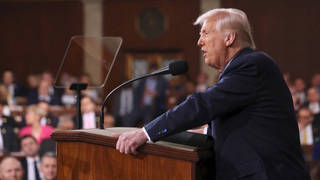
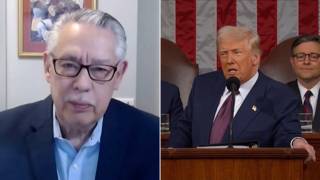
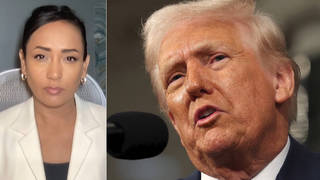
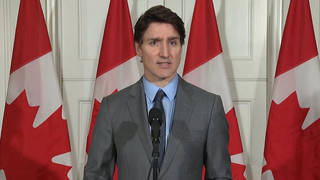





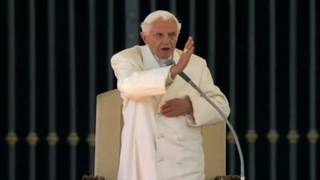
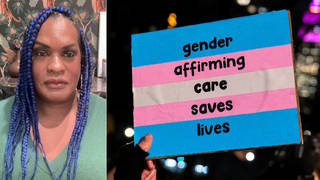
Media Options